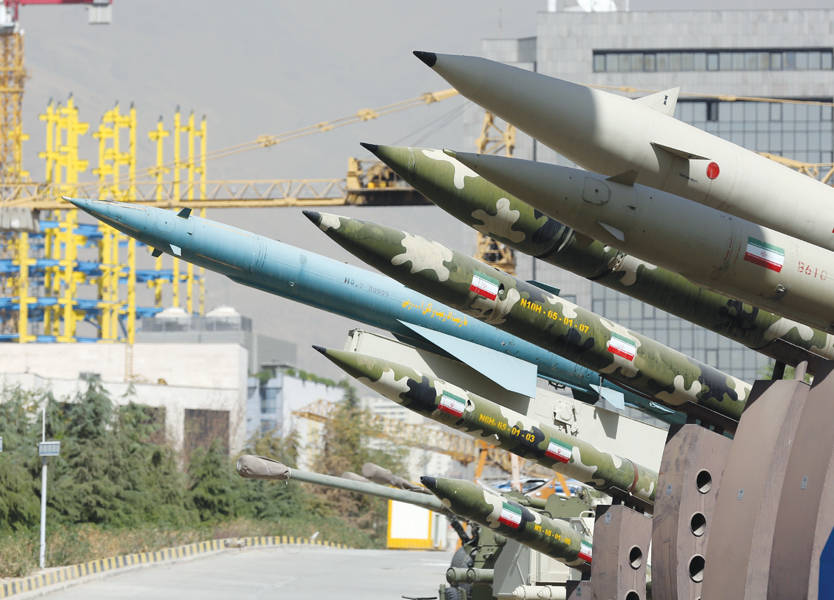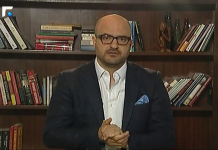إيران وراء الهجوم على منشآت النفط السعودية
إيلي ليك/الشرق الأوسط/17 أيلول/2019
Yes, Iran Was Behind the Saudi Oil Attack. Now What?
Eli Lake/Bloomberg/September 17/2019
Following the Houthi attack on Saturday on Saudi Aramco’s crude-oil processing facility, Secretary of State Mike Pompeo made an obvious and necessary point: Blame Iran.
It is obvious because the Houthi rebels in Yemen lack the drones, missiles or expertise to attack infrastructure inside Saudi Arabia. In 2018, a United Nations panel of experts on Yemen examined the debris of missiles fired from Houthi-controlled areas of Yemen into Saudi Arabia and concluded there was high probability the weapons were shipped in components from Iran. As one Hezbollah commander told two George Washington University analysts in 2016: “Who do you think fires Tochka missiles into Saudi Arabia? It’s not the Houthis in their sandals, it’s us.” Hezbollah, of course, is a subsidiary of Iran’s Revolutionary Guard Corps.
Pompeo’s response is necessary because, historically, Iran pretends to seek peace as it makes war. This is why it sent Foreign Minister Javad Zarif to France last month to plead with the world’s great economic powers as it escalated its proxy war against Saudi Arabia. Iranian diplomacy depends on its adversaries treating the aggression of its proxies as distinct from its statecraft.
What is surprising is that Pompeo’s remarks have already drawn fire from leading Democrats. Even Senator Chris Murphy’s more nuanced view (or at least as much nuance as is possible in a tweet) gets the big picture wrong — and it’s worth dwelling on why.
Murphy starts by lamenting the secretary’s “irresponsible simplification” of “Houthis=Iran.” He is smart enough to acknowledge that Iran “is backing the Houthis and has been a bad actor.” He then strikes a note of naivete. “The Saudis and Houthis are at war,” he tweeted. “The Saudis attack the Houthis and the Houthis attack back.”
This kind of neutralism is regrettable for a few reasons. To start, the sheer scale and devastation of Saturday’s attack (the Saudis estimate that half of their oil production has been taken out) counts as an escalation. The effects are not limited to Yemen or the Persian Gulf. The world economy will suffer.
And while Murphy is correct to criticize Saudi brutality, as he has in the past, the two sides in this regional conflict are not equivalent. Iran is a revisionist power, challenging the status quo throughout the Levant and the Gulf. The US and its allies are trying to keep Iran in check. The US has tried to pressure Saudi Arabia to de-escalate, whereas Iran is pushing the Houthis to dig in.
Fortunately, Murphy and other Democrats will not decide how to respond to this latest aggression. This decision falls to President Donald Trump. And now is a good time to re-evaluate his recent push to negotiate with Iran. The president could start by reaffirming Pompeo’s 12 conditions for sanctions relief for Iran. Last month, Trump pared them down to three, narrowly related to its nuclear program. Indeed, the Houthi attack on Saudi Arabia shows just how important it is that any future deal commit the Iranian regime to ending its adventures in the Middle East.
Trump also now needs to reconsider military options to deter future escalations. As I have reported, US intelligence agencies have mapped the precise locations of Iranian bases and commanders in Yemen and the Middle East. If Trump wants to respond militarily without attacking Iranian territory, he has many targets outside the country.
If Trump continues to pursue negotiations with Iran’s regime, he will be inviting more attacks on America’s allies. This is exactly the strategy — and the consequences — followed and paid by his predecessor, Barack Obama, in his second term. During and after the negotiations for the nuclear deal, Iran armed and trained its proxies in Syria and later in Yemen. The Middle East is now paying for these mistakes. Trump would be a fool to repeat them.
إيران وراء الهجوم على منشآت النفط السعودية
إيلي ليك/الشرق الأوسط/17 أيلول/2019
في أعقاب الاعتداء الحوثي الذي استهدف منشأة تكرير النفط الخام بشركة أرامكو السعودية، أوضح وزير الخارجية مايك بومبيو نقطة واضحة وضرورية، وهي أن إيران تقف وراء الاعتداء. من الواضح أن المتمردين الحوثيين في اليمن يفتقرون إلى طائرات «درون» والصواريخ، وكذلك الخبرة اللازمة لمهاجمة البنية التحتية داخل المملكة العربية السعودية. في عام 2018، فحص فريق من خبراء الأمم المتحدة حطام الصواريخ التي تطلق من المناطق التي يسيطر عليها الحوثيون في اليمن تجاه المملكة العربية السعودية، وخلصوا إلى أن هناك احتمالاً كبيراً بأن تكون مكونات الأسلحة قد شحنت من إيران.
وهنا أتذكر سؤالاً وجهه أحد قادة «حزب الله» لمحللي جامعة جورج واشنطن عام 2016، حيث قال: «في رأيكم، من أطلق صواريخ توشكا على المملكة العربية السعودية؟ إنهم ليسوا الحوثيين في قواربهم الصغيرة بالطبع. نحن من فعلها، نحن». بالطبع، حزب الله، هو فرع للحرس الثوري الإيراني.
إن رد بومبيو ضروري لأن إيران، تاريخياً، تتظاهر بأنها تسعى للسلام، بينما في الحقيقة هي من تصنع الحرب. وهذا هو السبب في أنها أرسلت بوزير خارجيتها جواد ظريف إلى فرنسا الشهر الماضي، للتفاوض مع القوى الاقتصادية الكبرى في العالم في الوقت الذي صعدت فيه حربها بالوكالة ضد المملكة العربية السعودية. فالدبلوماسية الإيرانية تعتمد على خصومها وعلى تعاملهم مع عدوان وكلائها على أنه أمر أكثر تميزاً من فن حكم الدولة. والمدهش هو أن تصريحات بومبيو قد أثارت بالفعل انتقادات كبار أعضاء الحزب الديمقراطي. فحتى السيناتور كريس مورفي الأكثر دقة أخطأ في فهم الصورة الكبيرة، وعلينا هنا أن نحاول فهم السبب. يبدأ مورفي بالإعراب عن أسفه «للتبسيط غير المسؤول» لوزيرة الخارجية في قوله إن «الحوثيين = إيران». إنه ذكي بما يكفي للاعتراف بأن إيران «تدعم الحوثيين وأنها ممثل سيئ». ثم يقول عبارة لا تخلو من سذاجة؛ إن «السعوديين يهاجمون الحوثيين، والحوثيون يردون».
هذا النوع من الحياد أمر مؤسف لعدة أسباب؛ بادئ ذي بدء، فإن حجم الدمار الهائل الذي جرى السبت، هو ما يعد تصعيداً خطيراً لأن التبعات لا تقتصر على اليمن أو الخليج العربي فحسب، بل على الاقتصاد العالمي برمته.
إيران قوة رجعية، تتحدى الوضع الراهن في جميع أنحاء بلاد الشام والخليج، وتحاول الولايات المتحدة وحلفاؤها إبقاء إيران تحت المراقبة.
لحسن الحظ، لن يقرر مورفي وغيره من الديمقراطيين كيفية الرد على هذا العدوان الأخير، فهذا القرار يقع على عاتق الرئيس دونالد ترمب. والوقت الحالي هو الأنسب لإعادة تقييم مفاوضاته الأخيرة مع إيران. يمكن للرئيس أن يبدأ بإعادة تأكيد شروط بومبيو الـ12 لتخفيف العقوبات على إيران. في الشهر الماضي، قام ترمب بتخفيضها إلى ثلاثة، تتعلق جميعها ببرنامجها النووي. في الواقع، أظهر الهجوم الحوثي على المملكة العربية السعودية مدى أهمية أن تلتزم أي صفقة مستقبلية مع النظام الإيراني بوضع حد لمغامراته في الشرق الأوسط. يحتاج ترمب الآن إلى إعادة النظر في الخيارات العسكرية لردع التصعيد في المستقبل. وكما ذكرت، قامت وكالات الاستخبارات الأميركية بتحديد المواقع الدقيقة للقواعد والقادة الإيرانيين في اليمن والشرق الأوسط. فإذا أراد ترمب الرد عسكرياً دون مهاجمة الأراضي الإيرانية، فلديه أهداف كثيرة خارج البلاد. إذا واصل ترمب المفاوضات مع النظام الإيراني، فإن هذا يعني مزيداً من الهجمات على حلفاء أميركا. وهذا هو بالضبط الاستراتيجية – والعواقب – التي اتبعها ودفع ثمنها سلفه باراك أوباما خلال ولايته الثانية. فأثناء وبعد المفاوضات حول الاتفاق النووي، قامت إيران بتسليح وتدريب وكلائها في سوريا ثم اليمن. إن الشرق الأوسط يدفع ثمن هذه الأخطاء الآن، ومن الحماقة أن يكررها ترمب.
* بالاتفاق مع «بلومبرغ»




















